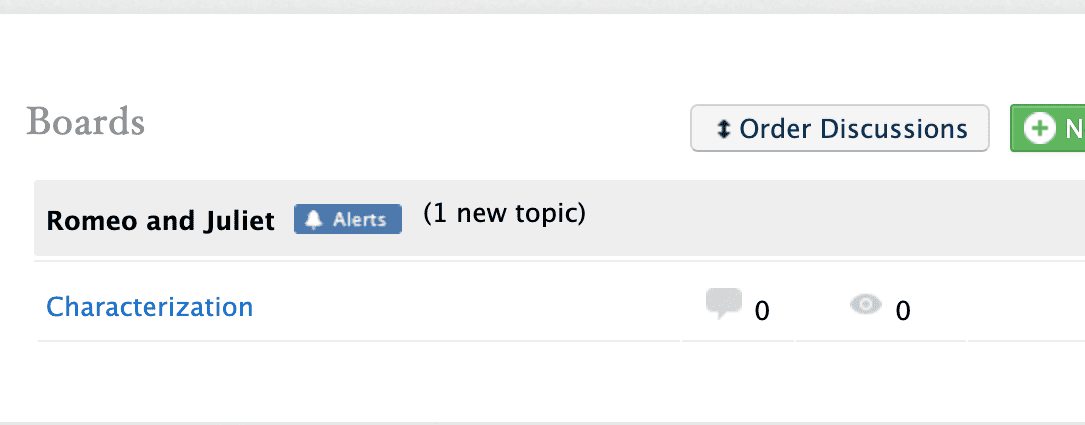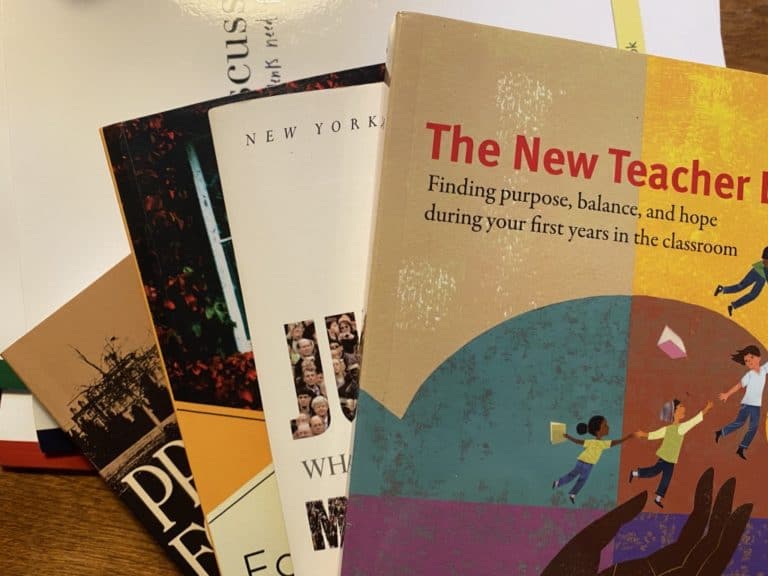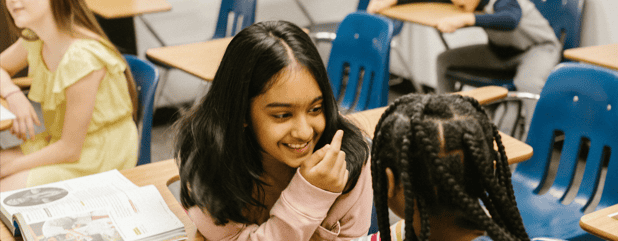Protagonists: 20 Minutes with Linda Rodriguez
Linda Rodriguez, English and History Teacher and Director of Virtual Learning, St. Andrew’s Episcopal School
Hometown I grew up in Lawrence, Kansas, home of the KU Jayhawks. My father was a professor, and my mother was a stay-at-home mom. I went to public schools and had an excellent education all the way through my own time at KU. That really paved the road for my commitment to equity and inclusion: the idea that every child everywhere deserves a quality education.
Favorite teacher growing up: who and why? In sixth grade, we had a new teacher. It was a really weird 1970s model at my school, with four classes in this huge open room. That teacher’s name was Lynda Wheeler. She was the first teacher that spoke to us like we were adults. We were little kids, but gosh, it was completely transformative in my educational journey to feel like I could contribute to the class myself. It wasn’t like Ms. Wheeler was opening my brain and throwing stuff in. She was interested in us as people, interested in what we had to say, interested in our ideas. I always want for the kids in my classes to feel like that: heard, seen, and known.

Describe yourself as a student in three words Chatty, engaged in learning, and maybe a little lazy.
Current City, School, Teaching Assignments (?) I teach English at St. Andrew’s Episcopal school in Ridgeland, Mississippi (just outside Jackson). This year, I’m teaching journalism and a senior English seminar called “Global Voices of Oppression.” I was originally hired to teach History. I’m also the Director of Virtual Learning. And, I teach a Civil Rights Literature class through Malone Schools Online Network (MSON). I’m moving more of my teaching into the virtual world; St. Andrew’s has really allowed me to pursue a lot of these interests.
Favorite historical figure (or best line from history?) There are so many! My favorite historical figures are the ones that you can point to and say “because this person lived, this changed the world.” So, Jesus (some people may not agree that he’s a historical figure), Julius Caesar, the Spartans at Thermopylae, Archduke Franz Ferdinand, Hitler, the good the bad the ugly. Those pinpoints of when the world changed. Steve Jobs!
Favorite literary character (or best line from a novel?) Ivan Denisovich from One Day in the Life of Ivan Denisovich. I first read this book in 10th grade, and I use it in the Global Voices class. We talk, in that class, about 20th century conflict from the loser’s point of view. It’s a tiny book about a single day surviving the Stalinist gulag. You can’t even think about tomorrow because there are so many tomorrows ahead of you. I’ve read the story 12 or 13 times, and I discover something new every time.
Favorite school supply? Pencil-top erasers! You get them in a package. They make the wooden pencil the most magical thing you could ever use. I love wooden pencils sharpened to the point where you could draw blood, with an eraser you can actually do something with.
Pet peeve about class (student-led?) discussion? When I’m trying to give a discussion a grade, you have to have a rubric. We’re a Harkness school, and students have to have those discussions a lot. Normally, my classes have more than sixteen kids, and I do them in different ways. When a kid meets a requirement in a graded discussion to get 100% and then totally checks out, that bothers me. Another thing that bothers me is when one kid takes over conversation.
Favorite moment of class discussion? My class is a flipped classroom, very discussion-based. I love it when we all have a gestalt moment – like, “I never thought of that! Is that what that really means?” That kind of a-ha moment when everybody is engaged, taken by surprise, and whoever is the person who thought of it feels so validated. It’s a perfect mix of validation, engagement, really interesting ideas that almost always come from the kids.
Biggest challenge to good discussion in a virtual classroom? Much like in an in-person classroom, the biggest challenge is to find ways to engage introverts. I use blogging outside of class for that. We also use backchannel chats – I’ll give the kids a question at the beginning of class, they’ll write a response to it, and they also have to write a response to a classmate. That’s one way to engage kids who don’t really like to speak up and/or out. It’s always a challenge, though, honestly. Oftentimes the kids who aren’t talking are thinking deeply and long, engaging in active listening. So many of us listen to formulate a response, but a lot of the quieter kids are listening more deeply.
Text you count on to inspire conversation? Right now, we’re on I, Rigoberta Menchu. In my class, we study the gulag, the Holocaust, Kashmir, Guatemala, Japanese incarceration. We look at TED talks and short stories and memoirs. We’re always talking about what the best vehicle is to help us enter into the experience of the oppressed. In I, Rigoberta Menchu, students read about the work at fincas, death at the hands of the military – and then I bring up the New York Times article about how not all of this story is true. The kids are livid! It’s interesting because we read so much fiction in this class, and yet because this book is presented as a memoir, when we find out it’s fiction, they’re so hurt. I love that – I love being able to surprise them at the end of anything and ask them to think differently about how and what they’re learning.
Recommended reads for teachers? Teach Like a Pirate by Dave Burgess. It’s all about how to find and channel passion – in your teaching and in planning your lessons. It’s all about how to spark a passion in a text that you might not naturally enjoy.
What do you nerd out about? I love anything about Ancient Rome. Anything. I was a Latin teacher for about 15 years before I moved into History and then English. I highly recommend the podcasts “Emperors of Rome” (everyone has a great Australian accent) and “When in Rome.” The first talks about historical figures, and the second about structures. I’ve told my husband that my dream gift would be three days to wander around Pompeii.
What is your wish for this world? I wish we could get along. Work together. I wish we could give each other grace. I wish that we could treat people the way we want to be treated individually and as a society.
When historians recount the last year, what will they be especially fascinated by? They will be so interested to see how the internet – and we are still in the infancy of the internet – how it has come to take up so much space in our lives. How we believe everything we see. You can call that fake news or trolling or whatever; we’re gullible! Historians will go back and wonder why we didn’t think more critically.
One prediction for the future of schools? I think that – I hate to say this – we’re never going to get rid of the virtual, in one way or another. Whether it’s adding virtual pieces into what we do, like using Google Classroom more, or finding ways for kids to connect virtually outside of class. Or, like we’re trying to do at St. Andrew’s, open up the school to students from other places to give them an excellent learning experience without being physically present.
Best advice given to you by a department chair or supervisor? The advice that I was given when I came to St. Andrews: “don’t try to teach like anybody else.” If the kids are engaged, if they’re learning, there’s nothing wrong with them loving your class.
Educator-Influencer you count on? First place you turn for classroom advice? I have two colleagues. Shout-out to Julie Rust, our head of Middle and Upper school for Teaching, Learning, and Innovation. She’s like my muse, in so many ways. She’s so incredibly thoughtful about the teaching process, and yet she’s excited, she has a smile any time you see her. Another partner in crime is Emily Philpott, our new Global Studies Director. She’s also a teaching coach for our Virtual Saints platform. She’s also absolutely fabulous, knows how to do everything on the computer, and also comes up with amazing in-person activities that can be translated online.
Better class discussions will _______________. Fundamentally change our society.






